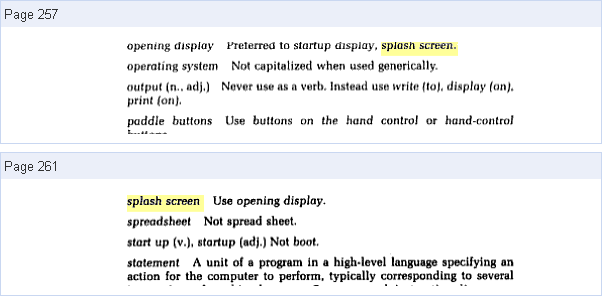While the image certainly splashes all over the screen, the immediate origins of the term might lie in the comic industry. A splash page or splash panel
... sometimes referred to simply as a "splash," is a full-page drawing in a comic book. A splash page is often used as the first page of a story, and includes the title and credits.
A computer application's splash screen serves a similar purpose and was probably first introduced some time in the mid-90s. The comics terminology predates the software variant by a number of decades, possibly all the way back to before WW2. One source notes:
Eisner's contributions seem more valuable than ever -- but it would be a grave mistake to dismiss his work merely as academically significant. Eisner is a first-rate draftsman and consummate storyteller whose work is as passionate as it is personal. His Spirit splash pages are legendary for their intricate detail and gorgeous symbolism; in fact, the term "splash page" was coined as a tribute to Eisner, who often utilized the movement of water to convey a sense of urgency and motion to his full-page artwork.
One can only be a little sceptical about the claim that the term was coined as a tribute to Eisner as it was in use well before his time, in the newspaper industry. ODO's entry for splash includes the following definitions:
2 [with object] print (a story or photograph, especially a sensational one) in a prominent place in a newspaper or magazine:
the story was splashed across the front pages
2 informal a prominent or sensational news feature or story:
a front-page splash
From some time in the 1910s:
It was first printed in the " Daily News", but the "Cologne Gazette" seized it as a useful article for heartening Germany and borrowing a custom from this country, dressed it up with suitable headlines for a "splash" page. One of these headlines ...
From The Making of Modern Journalism (1927):
Page 5 of the Daily Mail was therefore what is now often called the main splash page, though the type used for the headings was smaller than that employed by morning papers of the present day, whether serious or popular, and there were no ...
ODO's entry also includes a note on the phrase "make a splash" which sums things up nicely:
make a splash
informal attract a great deal of attention.
A computer's splash screen (be it during boot-up, operating system start-up, or application start-up) does something similar by arresting the attention of the user with a pretty graphic, a bold title, and other miscellany while the application is loaded in the background. It is literally and figuratively making a splash on your screen.

